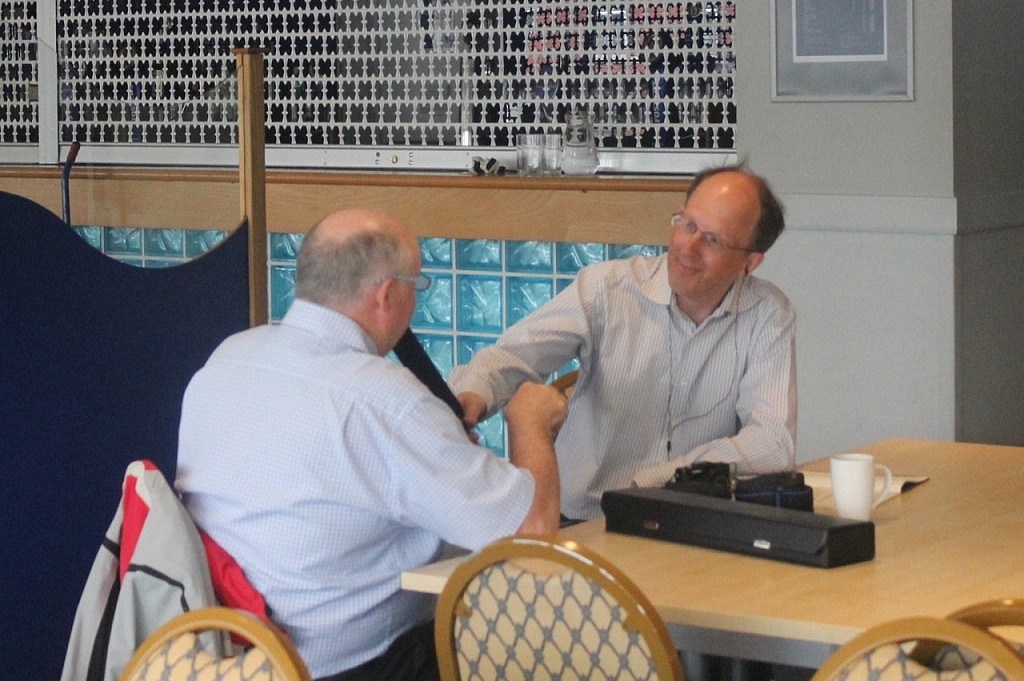Everton FC leads the way in community dementia support
Dementia care is a “quiet crisis” that already touches many families and will touch many more as we live longer in our old age and the huge baby boomer population reaches retirement age.
The Alzheimer’s Research Trust estimate that 1 in 3 over the age of 65 will have dementia by the time they die. Alzheimer’s disease is one type of dementia.
To cope with this explosion, more care will need to be provided in the community.
Mersey Care NHS Trust, who provide mental health care in Liverpool, Sefton and Kirby, have partnered with Everton FC, an English Premier League Club to support members of the local community with dementia.
The innovative program called “Pass on the Memories” (Twitter: @efc_potm) helps more than 120 people with memory loss through activities that take place two days a week at Goodison Park. Support is offered via facilitators in the club and health professionals from Mersey Care.
The meetings help trigger sporting memories, but also engages participants in group social activities and visits, thereby keeping them mentally active and engaged.
When I visited, members of the group were about to head off for a visit to the Museum of Liverpool, which would no doubt stimulate powerful memories for many.
As some readers of the blog may know, my mother Audrey (who died recently at age 89) had Alzheimer’s disease. It’s a progressive disease with no known cure. I watched her memory slowly but surely deteriorate over several years. A keen dancer, she reached a point where she couldn’t remember how to dance anymore.
What Everton FC is doing by lending their support to the Pass on the Memories scheme, is something that sporting clubs around the world should all consider in their communities.
Sporting clubs derive considerable support from local communities and have facilities that are vastly underused outside of games. Many of their fans will sadly develop dementia. Engaging the local community in this way is a tremendous way of giving back.
As social services continue to be cut back in Liverpool due to budget cuts, I’m impressed by the way Mersey Care and Everton FC are helping those with dementia have the best quality of life they can through this type of local partnership.
If it didn’t exist, I expect many people would end up just sitting at home all day with little mental stimulation or interaction.
During my visit to Goodison Park, I spoke with Everton FC Community Engagement Manager, Henry Mooney (@HMooney23) who plays a key role in running the Pass on the Memories program at the club. He told me you don’t have to be an Everton fan to participate. 🙂
Living with Alzheimer’s disease is not easy. Unlike a physical disability, you can’t readily tell if someone has dementia, they look normal much like the rest of us.

Tommy Dunne, 61, was diagnosed with early stage Alzheimer’s disease three years ago. He told me that just because he has dementia, does not mean he is demented. Raising awareness of dementia and getting rid of the stigma associated with it is something we all can help with.
As the number of people with dementia grows, those who provide services (shops, transport etc) will need to be educated on how they can help people with dementia maintain their independence and undertake the activities of daily living that we all take for granted.
I was pleasantly surprised and pleased to see that Tommy is active on Twitter (@TommyTommytee18). It’s a great way to share his experiences.
I’ve included excerpts of the interviews I did with Tommy and Henry Mooney in the radio documentary on dementia that I produced – you can listen via the embedded SoundCloud at the end of this post or using this link.
If you are in the Liverpool area and have a family member with dementia, I encourage you to find out more about this innovative program.
Taking a more strategic view, I’m still shocked by how little progress there has been in drug development to tackle dementia, and in particular Alzheimer’s disease.
In comparison to oncology where research is focused on multiple new targets for drugs, as well as novel biomarkers that can help predict who are more likely to respond, dementia research seems like a record stuck in the groove.
Focusing on one target has failed to yield an effective Alzheimer’s drug despite spending hundreds of millions on clinical research.
More needs to be done to understand the biology of Alzheimer’s disease and generate new insights into potential new targets that at the very least delay the progression of a disease that many of us will possibly end up with in the future.
Update April 30, 2014: Everton FC write up my visit on their Community news site
I was thrilled to hear that John Howard, (@JHowEFC08) Media Officer for Everton in the Community has written about my visit to the Pass on the Memories program. He’s published a really well written post on the Everton FC community website that goes into more detail about the program.
Here’s the link to John’s piece if you are interested in more information: Pieter’s views on Pass on the Memories
Update May 19, 2014: Talking about Dementia on BBC Radio Merseyside Daybreak show
At the start of Dementia Awareness Week in the UK, I was very grateful for the opportunity to go on the May 18, 2014 edition of BBC Radio Merseyside’s Daybreak show, produced by Helen Jones.
I talked about my late mother, Audrey and some of the innovations in dementia care that I’ve written about on the blog. If you have the chance do listen to an excerpt from the show:
Update June 5, 2014: listen to living well with dementia – a personal journey
My research into Everton’s Pass on the Memories program was undertaken while on a BJTC accredited diploma in radio journalism course based at Radio City in Liverpool. You can listen via SoundCloud to the documentary I produced on living well with dementia – a personal journey:
